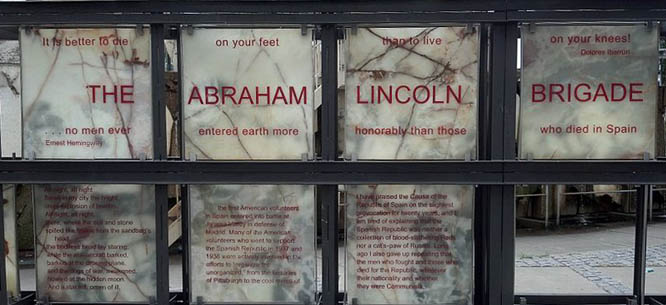The Humanitarian Replacement
The Humanitarian Replacement

For the last few years the blogosphere, though only in its more obscure places, has been full of comparisons of the Spanish and Syrian civil wars. The Workers International to Rebuild the Fourth International called for a new International Brigade to rescue “the Syrian masses,” who are being betrayed by everyone in sight—which is probably right. A writer for the National Interest, who opposes any kind of US intervention in Syria, told those who support intervention that they should form an International Brigade, as the Communists did in Spain, and go there themselves (the web editor for the Volunteer, the publication for the Veterans of the Abraham Lincoln Brigade, linked his readers to this piece). Jonathan Todd, on the UK site Labour Uncut, asked why there is no International Brigade in Syria today and responded that sometime after the Spanish Civil War people like him decided that they would rather run in “sponsored half-marathons” (for some charitable cause) than fight in a foreign country. Here is my own version of the Spain/Syria comparison.
Looking back, what is most surprising about the Spanish Civil War is that it did not give rise to organizations like Doctors Without Borders or Human Rights Watch. The Quakers tried in a small way to help victims of the war during the fighting, but no one came to join them, and no one was committed to document the war’s atrocities. It was only when the war ended that the Spanish Refugee Relief Association got going; it mainly looked after exiled defenders of the Spanish Republic and their families in southwestern France. Neither humanitarian aid nor human rights violations were significant issues while the fighting lasted, and volunteer aid workers did not rush to Spain. Instead the volunteers who came were fighters in the International Brigades.
The Western democracies—France and Britain (with the silent acquiescence of the United States)—refused to help the republic, even though the fascist rebels had active support from Germany and Italy. The Soviet Union moved in with instructions to the Comintern to organize the brigades, whose soldiers came from all over—from Eastern Europe, Germany, France, Italy, Britain, and the United States, too. They were mostly communists, but many were not: several thousand, including George Orwell, fought with POUM, the Trotskyist organization, and others fought with the anarchists. They were officially part of the Republican Army, but most of the brigades were subject to Communist Party discipline; the commissar of the Abraham Lincoln Brigade was John Gates, the future editor of the Daily Worker.
A left tradition was being continued here: think of Lafayette, von Steuben, Kosciuszko, and Pulaski in the American Revolution and of Lord Byron and many others in the Greek Revolution—including the largely forgotten American radical, Samuel Howe, who rushed to Greece in the early 1820s and later fought in the Polish uprising of 1831; he was a militant abolitionist and one of the first proponents of the progressive income tax. Though the communist leaders of the brigades turned out to prefer killing Trotskyists to fighting Franco, most of the volunteers were deeply committed to a democratic and anti-fascist politics; the Americans among them may have thought of themselves as Marxists, but they were also the spiritual descendents of Samuel Howe.
Now look at the Syrian civil war, in which all the contemporary humanitarian aid and human rights organizations are actively engaged. Refugee relief hasn’t waited for the end of the fighting. The documentation of atrocities began with the beginning of the war, and so did assistance for the war’s victims. I suspect that all the aid organizations are hostile to the Assad regime, which plays the part of the fascists in this story, but they are officially neutral, non-political, focused on human suffering, not on regime change (or regime maintenance or any other political goal).
Once again, as in Spain, the Western democracies are disengaged or, in this case, only marginally engaged, not neutral but not militarily active on the side of the rebels—some of whom can plausibly be called the Syrian version of the anti-fascist, pro-republican fighters in Spain. The story is much more complicated than Spain was, with Russia, Iran, and the Lebanese Hezbollah supporting the “fascists” and the Saudis and Qataris helping the rebels—though probably not the democratic rebels. But the crucial difference with Spain is that there are no left-wing International Brigades; no recruitment effort is under way; no volunteers from the global left are rushing to fight the Assad regime. There is an International Brigade in Syria, called ISIS (Islamic State of Iraq and Syria), with recruits from Pakistan and Saudi Arabia, Chechnya and Uzbekistan, Iraq and Lebanon—and from Western Europe and the United States, too. But these fighters don’t stand in the tradition of Lafayette, Byron, and Orwell. No leftists from Europe or North America are actively engaged in helping the “good guys” win.
The aid organizations and the human rights organizations have replaced the brigades—or, rather, they are the contemporary left’s International Brigade. Their volunteers come from all over, and while they don’t fight, they are heroes nonetheless who take great risks to carry on their work. This is the internationalism of the twenty-first century; the internal politics of humanitarian aid and human rights have produced many important arguments about neutrality and engagement. But what I want to stress here is that this is a new politics; these are new arguments. They signal the end of the old left version of internationalism, which included a commitment, and an ability, to recruit fighters and send them into battle in faraway places. Now it is only jihadi Islamists who are able to do that.
In the 1990s we rightly took humanitarianism and human rights agitation to represent a great advance for the left. Looked at from the perspective of Spain in the 1930s, however, they also represent a historic retreat.
Michael Walzer is the co-editor emeritus of Dissent.






